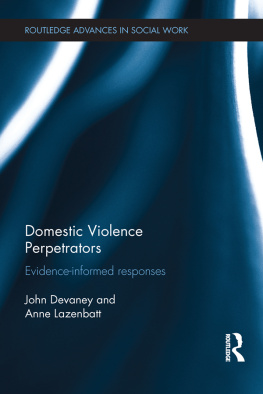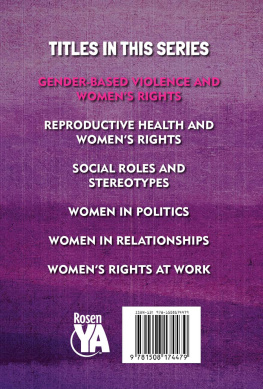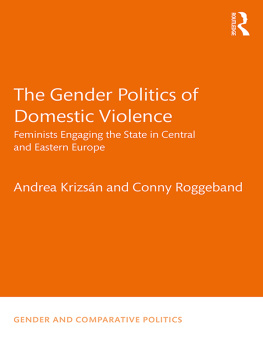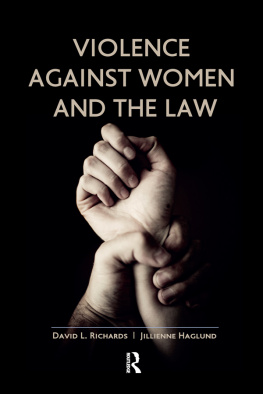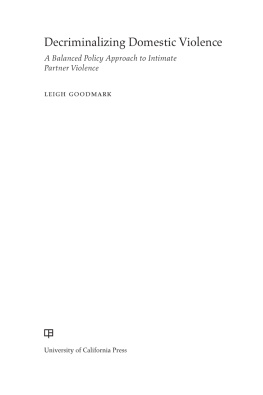Contents
Guide
Pagebreaks of the print version
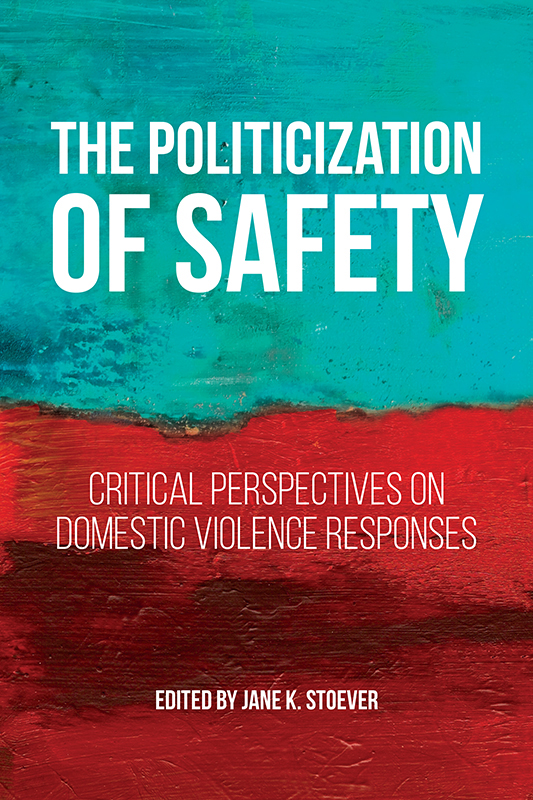
THE POLITICIZATION OF SAFETY
FAMILIES, LAW, AND SOCIETY SERIES
General Editor: Nancy E. Dowd
Justice for Kids: Keeping Kids Out of the Juvenile Justice System
Edited by Nancy E. Dowd
Masculinities and the Law: A Multidimensional Approach
Edited by Frank Rudy Cooper and Ann C. McGinley
The New Kinship: Constructing Donor-Conceived Families
Naomi Cahn
What Is Parenthood? Contemporary Debates about the Family
Edited by Linda C. McClain and Daniel Cere
In Our Hands: The Struggle for U.S. Child Care Policy
Elizabeth Palley and Corey S. Shdaimah
The Marriage Buyout: The Troubled Trajectory of U.S. Alimony Law
Cynthia Lee Starnes
Children, Sexuality, and the Law
Edited by Sacha Coupet and Ellen Marrus
A New Juvenile Justice System: Total Reform for a Broken System
Edited by Nancy E. Dowd
Divorced from Reality: Rethinking Family Dispute Resolution
Jane C. Murphy and Jana B. Singer
The Poverty Industry: The Exploitation of Americas Most Vulnerable Citizens
Daniel L. Hatcher
Ending Zero Tolerance: The Crisis of Absolute School Discipline
Derek W. Black
Blaming Mothers: American Law and the Risks to Childrens Health
Linda C. Fentiman
The Politicization of Safety: Critical Perspectives on Domestic Violence Responses
Edited by Jane K. Stoever
The Politicization of Safety
Critical Perspectives on Domestic Violence Responses
Edited by
Jane K. Stoever

NEW YORK UNIVERSITY PRESS
New York
NEW YORK UNIVERSITY PRESS
New York
www.nyupress.org
2019 by New York University
All rights reserved
References to Internet websites (URLs) were accurate at the time of writing. Neither the author nor New York University Press is responsible for URLs that may have expired or changed since the manuscript was prepared.
Library of Congress Cataloging-in-Publication Data
Names: Stoever, Jane K., editor.
Title: The politicization of safety : critical perspectives on domestic violence responses / edited by Jane K. Stoever.
Description: New York : New York University, 2019. | Includes bibliographical references and index.
Identifiers: LCCN 2018020945| ISBN 9781479805648 (cl : alk. paper) | ISBN 9781479806287 (pb : alk. paper)
Subjects: LCSH: Family violenceLaw and legislationUnited States. | Family violencePreventionUnited States.
Classification: LCC KF 9322 . P 65 2019 | DDC 362.82/9270973dc23
LC record available at https://lccn.loc.gov/2018020945
New York University Press books are printed on acid-free paper, and their binding materials are chosen for strength and durability. We strive to use environmentally responsible suppliers and materials to the greatest extent possible in publishing our books.
Manufactured in the United States of America
10 9 8 7 6 5 4 3 2 1
Also available as an ebook
CONTENTS
Jane K. Stoever
Mimi E. Kim
Deborah M. Weissman
Elizabeth L. MacDowell
Alisa Bierria and Colby Lenz
Cynthia Godsoe
Amy M. Magnus
Donna Coker
Natalie Nanasi
Leigh Goodmark
Jane K. Stoever
Mary D. Fan
Jamie R. Abrams
Courtney Cross
Caroline Bettinger-Lpez
Introduction
JANE K. STOEVER
The Politicization of Safety has multiple meanings and dimensions. This book calls for debate and consideration of some unquestioned and generally bipartisan assumptions, particularly about carceral responses to domestic violence, while maintaining the fundamental right of all people to be free from violence. Some contributors to this volume examine politics in the more traditional partisan sense, using legislative battles to illuminate growing divisions while surfacing values motivating different policies. Others examine politics and tensions within the anti-domestic violence movement and evaluate this movements position in relation to other social issues and progressive concerns. The feminist movement has championed unity and equality, but has also been marked by tensions and fractures, and differing perspectives and alliances naturally influence policies and practices. The politics of advocacy and narratives surrounding victims/survivors are also implicated, and the book challenges readers to question assumptions, expand perspectives, and consider larger justice issues.
Domestic violence is an issue commonly assumed to be bipartisan and nonpolitical, with politicians of any party seeking headlines saying they are working against domestic abuse. Yet racial and gender politics, the move toward criminalization, reproductive justice concerns, immigration policies, gun control debates, and other factors and political interests increasingly shape responses to domestic violence.
Across party lines, we should agree to work for societal change and healing to prevent and remedy intimate partner violence and sexual violence. In our exploration of the politicization of safety, we may determine that some issues simply should not be up for debate; opposition seems irrational and contrary to our countrys safety, justice, and autonomy principles. For example, research shows that firearms in the hands of domestic abusers increase the likelihood of homicide fivefold. Further congressional hearings are not needed, nor should positions about domestic abusers access to firearms be divided along political lines. Yet as more and more public massacres occur by armed gunmen, almost all of whom have histories of perpetrating domestic violence, the National Rifle Association calls for more guns in the hands of more Americans, while advocates for gun safety and against family violence see the shootings as evidence of firearm danger and problems with ease of access to rapid-fire, high-lethality weapons. Both sides of the gun control debate become further entrenched and our country fails to make meaningful progress regarding these preventable deaths.
At the same time, as several authors in this volume point out, some governmental responses to domestic and sexual violence should be politicized and debated in ways foreign to the dominant political discourse in the United States. For decades, criminalization and use of law enforcement was the default response to social problems across party lines. But intersectional scholarship and grassroots activism have begun to trouble this unquestioned consensus, showing that automatic recourse to law enforcement can be ineffective, traumatic, autonomy-denying, and even dangerous, particularly for people of color and those without secure legal immigration status.
Upon analysis, we see that safety is a political issue, particularly for women and people of color. The question this book poses is: What should the terrain of debate be?
The legislative battle regarding the most recent reauthorization of the Violence Against Women Act (VAWA) provides a prime example of the politicization of safety. First passed in 1994, this landmark federal legislation recognized the scourge of domestic violence; created new legal remedies, including immigration remedies for qualifying abuse survivors; and authorized multiple grant-funding programs. After several bipartisan reauthorizations that expanded immigration remedies and created additional legal protections, VAWA became a source of contention between political parties. During 2012 and 2013, VAWA expired for over 500 days due to U.S. Senate and House differences over whether VAWA would include the protection of Native American abuse survivors; require college campuses to develop responses to sexual assault; and prohibit discrimination against lesbian, gay, bisexual, and transgender domestic violence survivors. These protections should not serve as hot-button flashpoints, but rather should be accepted as basic, necessary, and long overdue in todays world. VAWA again faces reauthorization and expiration in 2018, and the topic of the politicization of safety is more relevant than ever. This is particularly so given the Trump administrations multiple anti-immigrant executive orders, rollbacks of protections for transgender individuals, and the decision to overturn asylum protections for domestic violence victims.


